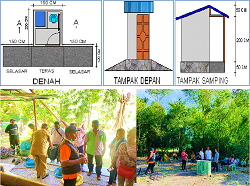Pelatihan Sanitasi Inklusi Mewujudkan Akses Sanitasi Layak bagi Penyandang Diasbilitas di Kelurahan Babau Kabupaten Kupang Inclusive Sanitation Training to Achieve Access to Proper Sanitation for People with Disabilities in Babau Village, Kupang Regency
Main Article Content
Abstract
Access to proper sanitation for all people is one of human rights. Even though access to latrines in the community continues to increase, there are still vulnerable groups such as women, children and people with physical disabilities who are still limited in getting their rights. Community service activities aim to increase public knowledge about inclusive sanitation, namely sanitation that can be reached by persons with disabilities. The method of activity carried out is training and making latrines with examples of inclusive sanitation. The targets of the training activities are community level stakeholders and persons with disabilities. The results of the activity showed an increase in respondents' knowledge about inclusive sanitation. Apart from that, model building can increase access to sanitation for persons with disabilities. The construction of model latrines involves relevant stakeholders. It was concluded that inclusive sanitation training methods and development of inclusive sanitation models can increase access to proper sanitation for persons with disabilities.
Downloads
Article Details

This work is licensed under a Creative Commons Attribution-ShareAlike 4.0 International License.
Authors who publish with this journal agree to the following terms:
- Any article on the copyright is retained by the author(s).
- Author grant the journal, right of first publication with the work simultaneously licensed under a Creative Commons Attribution License that allows others to share work with acknowledgment of the work authors and initial publications in this journal.
- Authors are able to enter into a separate, additional contractual arrangements for non-exclusive distribution of published articles of work (eg, post-institutional repository) or publish it in a book, with acknowledgment of its initial publication in this journal.
- Authors are permitted and encouraged to post their work online (e.g., in institutional repositories or on their websites) prior to and during the submission process, as can lead to productive exchanges, as well as earlier and greater citation of published work.
- The article and any associated published material is distributed under the Creative Commons Attribution-ShareAlike 4.0 International License
References
Cronk, R. & Bartram, J. (2018). Environmental conditions in health care facilities in low- and middle-income countries: Coverage and inequalities. International Journal of Hygiene and Environmental Health, 221(3), 409–422. https://doi.org/10.1016/j.ijheh.2018.01.004
Luh, J., Baum, R., & Bartram, J. (2013). Equity in water and sanitation: Developing an index to measure progressive realization of the human right. International Journal of Hygiene and Environmental Health, 216(6), 662–671. https://doi.org/10.1016/j.ijheh.2012.12.007
Lustiyati, E. D. & Rahmuniyati, M. E. (2019). Aksesibilitas Sarana Sanitasi bagi Difabel di Tempat Transportasi Umum. INKLUSI, 6(1), 93–126. https://doi.org/10.14421/ijds.060105
Ndaumanu, F. (2020). Hak Penyandang Disabilitas: Antara Tanggung Jawab dan Pelaksanaan oleh Pemerintah Daerah. Jurnal HAM, 11(1), 131-150. http://dx.doi.org/10.30641/ham.2020.11.131-150
Ngambut, K. (2019). Stop BABS behabiour after the open defecation free declaration in the context of rural communities in Kupang district, NTT Province. International Journal of Medicine, Health and Food Sciences, 3(2), 1–17.
Obani, P. C. (2018). Strengthening the Human Right to Sanitation as an Instrument for Inclusive Development. London: CRC Press. https://doi.org/10.1201/9780429461194
Pestaña, M. Í., Pérez-García, A., & Abad, R. F. (2022). Healthcare-associated infections. Medicine - Programa de Formación Médica Continuada Acreditado, 13(56), 3267–3276. https://doi.org/10.1016/j.med.2022.05.010
Salmah, S. & Tamjidnoor, T. (2019). Aksesibilitas Pendidikan Bagi Kaum Disabilitas Pada Madrasah Ibtidaiyah Negeri (MIN) Di Kota Banjarmasin. Al-Banjari : Jurnal Ilmiah Ilmu-Ilmu Keislaman, 18(1), 127-152. https://dx.doi.org/10.18592/al-banjari.v18i1.2995
Widjaja, A. H., Wijayanti, W., & Yulistyaputri, R. (2020). Perlindungan Hak Penyandang Disabilitas dalam Memperoleh Pekerjaan dan Penghidupan yang Layak bagi Kemanusiaan. Jurnal Konstitusi, 17(1), 197–223. https://doi.org/10.31078/jk1719
Yoga. (2022). Pemkab Manggarai deklarasi 100 persen Pilar 1 dan 2 STBM GESI. https://www.manggaraikab.go.id/pemkab-manggarai-deklarasi-100-persen-pilar-1-dan-2-stbm-gesi/
